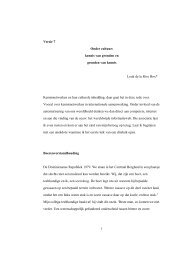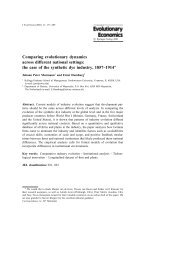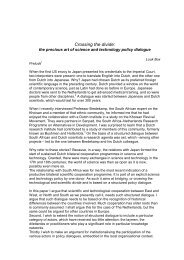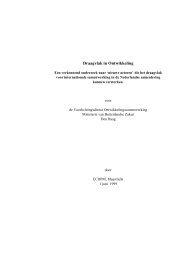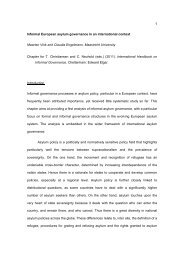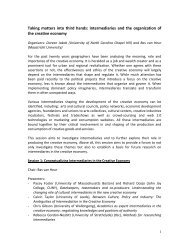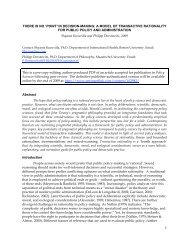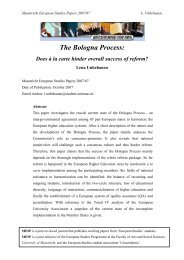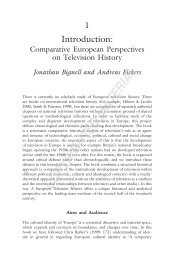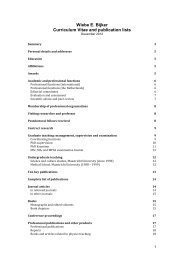Winds of Change: The Europeanization of National Foreign Policy
Winds of Change: The Europeanization of National Foreign Policy
Winds of Change: The Europeanization of National Foreign Policy
You also want an ePaper? Increase the reach of your titles
YUMPU automatically turns print PDFs into web optimized ePapers that Google loves.
Maastricht European Studies Papers 2007/01 Bennet Strang<br />
there<strong>of</strong> will be provided. <strong>The</strong> reader, thus, gets an impression <strong>of</strong> the real-life repercussions<br />
<strong>Europeanization</strong> has on national foreign policy cultures, their ways <strong>of</strong> conduct and, finally,<br />
their transformation against the European backdrop.<br />
2. At the Heart <strong>of</strong> <strong>Foreign</strong> <strong>Policy</strong> – Sovereignty<br />
“One <strong>of</strong> the most important analytical challenges for scholars <strong>of</strong> international relations is to<br />
identify different meanings <strong>of</strong> state, sovereignty and territory, and to understand their origins,<br />
comprehend their changes <strong>of</strong> meaning, analyze their interrelationships, and characterize their<br />
transformations” 1<br />
In the undertaking <strong>of</strong> tracing the impact <strong>of</strong> <strong>Europeanization</strong> on foreign policy, the analytical<br />
emphasis must firstly be on the dynamic concept <strong>of</strong> sovereignty. Elaborating on its meaning,<br />
methodological linkages with foreign policy and the changes it underwent will provide the<br />
framework to position an analysis <strong>of</strong> the <strong>Europeanization</strong> <strong>of</strong> foreign policy. However, the very<br />
meaning <strong>of</strong> the concept <strong>of</strong> sovereignty has to be clarified first.<br />
Principally, the concept <strong>of</strong> sovereignty has been and still is a central and popular one<br />
in the international system, on top <strong>of</strong> which it is “…difficult to acquire – and to lose” (Hill,<br />
2003, p. 31). Connected to the notions <strong>of</strong> authority, identity and territory (Biersteker, 2002),<br />
“…sovereignty means that a state enjoys political independence from other states” (Jackson/<br />
Sørensen, 2003, p. 280). Being the promising guiding light <strong>of</strong> all nations seeking to brake<br />
away from colonial rule or dominant oppressors and aiming to establish a sovereign, i.e.<br />
independent, nation-state, the possession <strong>of</strong> sovereignty is synonymous with having had the<br />
power to acquire and maintain it (Hill, 2003). Likewise, the mentioning <strong>of</strong> sovereignty in a<br />
Westphalian sense took and continues to take place in one stroke <strong>of</strong> breath with reference to a<br />
state, just as you have to say B after you have said A (Biersteker, 2002).<br />
<strong>The</strong> ‘state’, however, is essentially a socially constructed concept (ibid). This gives<br />
rise to the question <strong>of</strong> how the concept <strong>of</strong> sovereignty will adapt to possible changes in the<br />
definition <strong>of</strong> a ‘state’, in the context <strong>of</strong> European integration and the intrusive forces <strong>of</strong><br />
globalization. Unquestioningly, “…the possibility <strong>of</strong> change in the operational meaning <strong>of</strong><br />
sovereignty…” (p. 162) exists, which is underlined by the continuously evolving connotations<br />
<strong>of</strong> the dynamic concepts <strong>of</strong> both sovereignty and state (ibid.; Jackson/ Sørensen, 2003). <strong>The</strong><br />
explanatory scope <strong>of</strong> traditional realist state-centric approaches, however, does not account<br />
for such transformations (ibid.; Biersteker, 2002). Nevertheless, the fact that the Westphalian<br />
concept <strong>of</strong> sovereignty has undergone considerable change and currently continues to do so<br />
1 (Biersteker, 2002, p. 157)<br />
2



